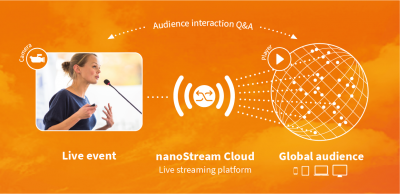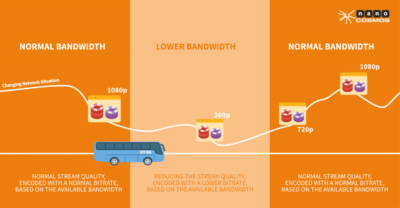Over the past year, we’ve seen video communication on an unprecedented scale, from remote work to virtual conferences and live-streamed events like webinars and town hall meetings, theatre and music. Live Streaming, for both business and pleasure, has become part of our everyday lives — and this shift creates new unique opportunities. When physical meetings and events are cancelled, video communication is the only way to keep interaction alive. To share a live video stream with a global audience with access from any device, interactive live streaming comes into play.
What Is Interactive Live Streaming?
While live video streaming typically just delivers content in a one directional way, interactive live streaming allows the audience to participate and interact e.g. via chat, Q&A, polls. This also applies to bidding, betting or online gaming where interaction is mandatory. This is often referred to as a ‘lean forward’ experience compared to ‘lean back’ scenarios like watching an event via stream. In a lean forward experience, the audience is an active part of your content, having the chance to influence it. Especially during the pandemic interactive live streaming offered a new opportunity to connect with the audience and engage viewers. However, there are technology challenges. For starters, latency (the time to deliver the stream ‘from glass to glass’, from the camera to the viewer) of an interactive live stream needs to be kept ultra low to maintain smooth interaction. This requirement applies on a global scale for any network. As most users are now using mobile phones as their primary internet device, it is important to enable mobile-first easy access directly in the browser. For vendors, easy integration of live streaming into their web applications is important to focus on their business priorities. 
Some options, such as the advanced ultra-low latency live streaming platform nanoStream Cloud enable service providers to stream content to large audiences with almost no delay, while letting viewers interact in the most natural fashion, offering the closest experience you can get to actually being there.
Use Cases
On Stage Events: Town Hall Meetings, Podium Discussions, Cultural Events.
Adding interactivity creates new opportunities for performers and audiences to connect. This is a new milestone in user experience for live streaming. Event organisers are now able to host live concerts during which viewers can request their favourite songs, cheer, buy merchandise and interact in several other ways. Besides, during the COVID-lockdowns, several new use cases from the business world emerged: A large corporation was looking for a solution to host town hall meetings and conduct polls with their employees at the same time. Another company needed a project to be completed that had the mandate to inform the public and offer live Q&A to remotely connected participants. Without traditional hosting options, interactive live streaming was an inexpensive way of accomplishing audience engagement for these and many more scenarios.
Hybrid Events Are Here To Stay
We are likely to see an increasing number of those events in the near future, because – if done right – they actually offer some key benefits over traditional platforms. Panel discussions provide a good example: panelists are not only live on stage, but also connected online. Scalable tech to stream events and meetings reduces the financial and environmental cost of travel as well as the individuals’ attendance time. Additionally, when interaction is enjoyable and in real time through low-latency streams, these solutions allow for networking across the globe and truly multi-national meetings.
Monetizing Use Cases: Online Gaming, Auction and Online Retail
Ultra-Low-latency streaming is also the preferred choice for online live retailers and many auction houses and real estate sales agents to present their offers in the virtual world ensuring bidders enjoy the excitement of the experience even if they don’t win the bid. Online gaming has increased drastically with the pandemic relocating entertainment – especially now with the legalization of online gambling in multiple countries.
Requirements for Successful Interactive Live Streaming
Latency – the competitive edge
At first it is all about how fast a stream can be delivered to determine what solution can be used for interactive use cases, but what is next? How to set-up an interactive live streaming solution successfully? For a successful business roll-out, the requirement that needs to follow is a clear understanding of the monetized business model. This determines other factors that come into play and that are part of the interactive live streaming workflow such as ingest, global network (CDN), player running on all devices and browsers, easy integration, robust service for 24/7 operation, requirements on the end-user’s side (browser-based use, visibility on mobile etc.). Latency depends on many factors and can only be achieved with full control and insight of all components of the live stream end-to-end.
One shop solution
The complex workflow of interactive live streaming asks for end-to-end control. Only then, all factors can be maneuvered through it according to the use case requirements. Mix and match of technologies can add a great layer of complexity to live streaming, besides that it can create streaming issues or increase the latency and time it takes to present content from the camera to the viewer. The easiest and most reliable way to live stream interactive content is adopting an all-in-one solution. This means that operators will have full control over their workflow: Ingest, network, delivery and player and everything in between to keep the quality of service high. On top of that, businesses benefit from a solution that is easy to use and can be branded and integrated into business web sites according to the corporate requirements. For better insight and quality of service, data metrics and analytics help you monitor and analyze live stream performance. A reliable service with instant live streaming 24/7/365 is mandatory with the goal of 100% availability and automatic failover in case of any network issues.
Leverage low bandwidth on a global scale
To have a global approach, the live streaming workflow must suit a powerful and reliable Content Delivery Network (CDN). This means to have an infrastructure that can deliver streams everywhere in the world. At present, many operators are taking a trial-and-error approach when it comes to the settings used for interactive live streams whereas they should be relying on modern technologies. The best solution will use ultra-low latency, adaptive bitrate playback to cope with all different types of network situations. They will also provide analysis of the live stream. Ultra-low latency ensures the delay between the presentation and the audience seeing it is well under one second, while the adaptive bitrate playback handles changing bandwidth. It works by reducing the stream quality, encoded with a lower bitrate, based on the available bandwidth. As soon as the bandwidth improves, so does the quality of the stream. 
Deliver interactive live streaming to desktop and mobile devices
One of the greatest challenges operators and providers face is ensuring that the best possible user experience is granted on both, desktop and mobile, at all times without any plugins and accessible from any browser. This requires a robust live streaming platform and powerful technology.
How to – interactive live streaming requirements at a glance:
Combining all the requirements is challenging, but key for successful interactive live streaming:
- Integrated solution and end-to-end control
- Easy to integrate
- Global delivery network (CDN) to deliver worldwide
- Player with Adaptive Bitrate Playback
- Running browser-based and on all devices including iOS
- Integrated Analytics to improve customer experience
- Light weight, stable and robust live streaming solution
Learn more about interactive live streaming
Future Investment Forum – Case Study about a large hybrid Event
To deliver a large business conference that took place in Saudi Arabia with world leading experts via interactive live streaming to 10K international participants, Damien Denoeud found nanoStream Cloud to be the perfect solution … Read more
ultra-low latency and the necessity for end-to-end control
If you’re delivering live video of any kind, latency is at the top of your list of concerns. This panel will discuss and debate best practices as well as the various technologies available to help you meet your latency targets … Read more
WebRTC’s ultra-low-latency capabilities
What is the secret sauce behind WebRTC’s ultra-low-latency capabilities and how does it compare to other streaming protocols? Which challenges are there, and which solutions? We cover it all in this article. Read more

